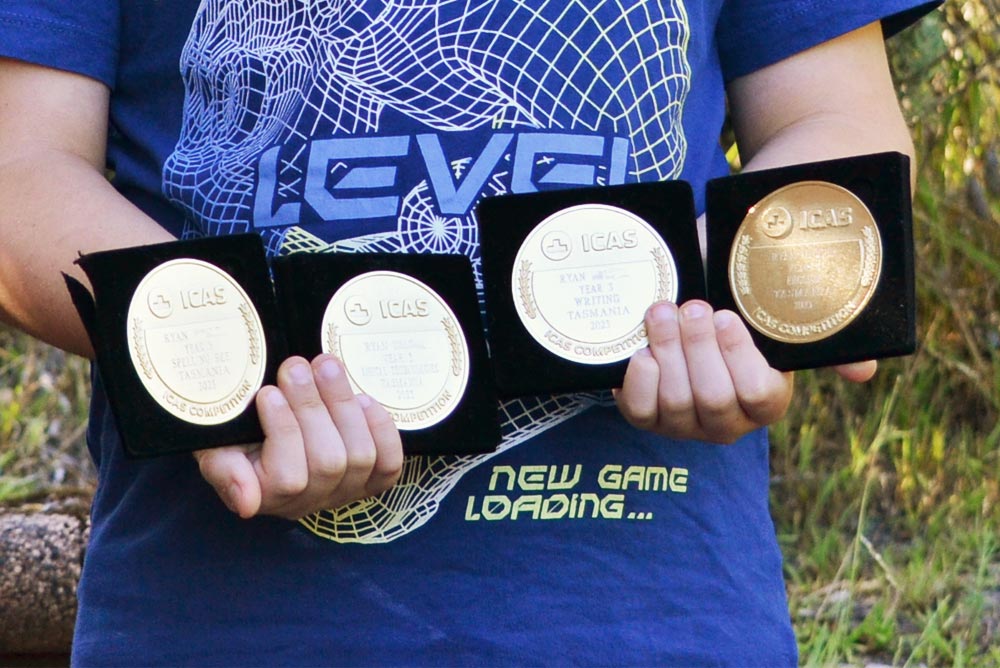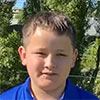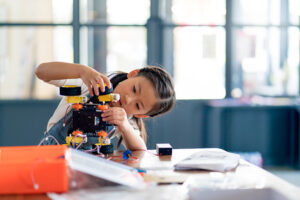How to win an ICAS medal – tips from medal winners

Winning an ICAS medal is an incredible achievement, and the recognition that goes along with it can really spur children onto greater things.
In this article, we’ve curated the greatest tips from past medal winners so that your child can learn from the best. Many of these students had similar advice, which is great because if they’re recommending the same thing, it shows that it really works!
Here they are in full – we hope they help your child get their highest possible ICAS scores, maybe even medals!
Medal winning tip #1: Relax
This was the most common tip shared by students, and for good reason: acute stress impairs your memory and cognitive flexibility, both of which are vital for exams.1
“You shouldn’t stress out too much. Otherwise you won’t be able to think too well.”
But as we all know, few people (let alone children) can relax on cue, especially in exam environments. A reasonable amount of stress is expected, and your child can make good use of it by trying to see it as a natural thing that their body does to prepare them for a challenge. Those butterflies in their belly, the dry feeling in their throat, the nervousness that jitters through their body – they aren’t threats. They’re just their body’s way of telling them that something significant is coming up, and that they need to focus.
“My number one tip would be don’t stress too much. It’s not the end of the world if you don’t finish all the questions. Just do your best and have fun!”
And while ICAS is significant, it’s not a high-stakes exam that will affect their future education. It’s designed to be a fun, low-stakes way for your child to challenge themselves and see how they get on. They want to do well, of course, but the less they feel they have to do well, the better they are likely to perform.
“My advice for students is to not worry about the result too much and just try your best.”
“Just relax and enjoy the challenge of the assessments.”
“Take your time and relax and you will get through the test. Try your best to enjoy it!”
There are, of course, some specific relaxation tips that you child might want to try before their ICAS tests. Belly-breathing is an effective way to reduce stress levels,2 as is mindfulness meditation,3 exercising and avoiding social media.4 They are valuable techniques for helping your child to relax their minds before taking ICAS.
“My best advice would be to compose your state of mind before sitting the ICAS assessment.”
Medal winning tip #2: Focus
As with any timed exam, your child will need to maintain their focus for the duration of their ICAS tests, answering each question as best they can. They can improve their focus by using many of the relaxation techniques listed above, namely exercise and meditation (as well as sleep, which we talk about more below).
In addition to maintaining focus, Year 3 medal winner Nick from South Australia also suggests that participants read each question carefully so that they fully understand what is being asked. If they’re not sure what a question means, James in Year 5 recommends trying to swap out some of the complicated words to simpler words – a nice little tip!
“My number one tip for ICAS is concentrate and read the question properly.”
“Even if a question is worded more complicated and you don’t understand some of the words, try to replace them with simpler words to make it easier for you.”
Another aspect of focusing is removing as many distractions as possible, and during classes and exams, one of your child’s biggest distractions are their friends. It’s even more tempting to talk to them when a tough question comes up, and the urge to procrastinate soars.
“You shouldn’t get distracted and you shouldn’t really sit next to your friends, so you don’t chat to them.”
Medal winning tip #3: Prepare
It goes without saying that if you want to do well in a test, you should prepare for it. ICAS is no exception.
ICAS tests are a little harder to prepare for because they are based on higher-order thinking skills (like critical thinking and problem-solving), but Year 9 medal winner Jessica from New South Wales has hit the nail on the head:
“Choose a subject you’re most comfortable with. I also recommend taking practice tests beforehand, if they’re available.”
In addition to taking subjects that you enjoy (though challenging yourself with others is also recommended), practice tests are one of the best ways to prepare for the ICAS test. There are a few great options:
- ICAS past papers – downloadable PDF tests that use real former questions taken from previous ICAS exams. These are very popular with students.
- RiSE+ – online practice tests that include specific ICAS-style tests. It’s also hosted on the exact same platform as ICAS, helping your child become familiar with the test environment.
- Sample tests – free sample tests that show your child what the ICAS test environment looks like, and how it works.
Ultimately, all of this preparation will help your child feel more calm, relaxed and confident on test day – important states of mind for winning an ICAS medal!
“Make sure you’re well prepared to answer the questions in time.”
Medal winning tip #4: Get plenty of sleep
Sleep is becoming more widely recognised for its importance in every area of life. It’s a pillar of health. Getting enough sleep will improve your child’s focus, memory, reasoning skills, decision-making and more.5 Eddie, a Mathematics medal-winner from Year 8 in South Australia, already knows this intuitively:
“Stay calm and have some sleep before the day you do it.”
However, as with relaxing, the tricky thing about sleep is that we can’t just click our fingers and descend into a delicious slumber, especially if we have a test that we’re nervous about the following day. Again, it can help your child to shift perspective and try to see the ICAS tests as fun opportunities for challenging themselves. A medal would be wonderful, of course, but they’re also very tough to win, so having reasonable expectations is important.
And once again, the relaxation methods listed in tip #1 can also improve with sleep length and quality, and help your child achieve their best ICAS results.
Medal winning tip #5: Come back to tough questions
This is an excellent tip from Bonnie in Tasmania. If your child gets stuck on a tough question (which they will – ICAS is super challenging), they can just flag the question, continue with the test, and come back to it later.
It’s a technique that has been used by students for decades, but it’s a great one.
“At the start of the test, try not to feel nervous. And if you get stuck on a question just hit the flag button and move on.”
Medal winning tip #6: Have an open mind
Our final medal-winning tip from Rishi is a little more philosophical. If your child goes into the ICAS test with an open mind, remembering that their expectations will almost certainly not be met, they’ll have a more flexible attitude to the tough challenges that appear before them. As Bruce Lee wisely stated, they’ll be “like water” and easily flow with the difficulties of the tests.
“Expect the unexpected. It will probably be harder than you think.”
Thanks to our proud medal-winners for their excellent advice, and best of luck to your child in this year’s ICAS competition!
References
- Grant S. Shields et al., 2016, The Effects of Acute Stress on Core Executive Functions: A Meta-Analysis and Comparison with Cortisol, Neuroscience & Biobehavioral Reviews
- Xiao Ma et al., 2017, The Effect of Diaphragmatic Breathing on Attention, Negative Affect and Stress in Healthy Adults, Frontiers in Psychology
- 2019, Mindfulness meditation: A research-proven way to reduce stress, American Psychological Association
- Adberrahman M Khalaf et al., 2023, The Impact of Social Media on the Mental Health of Adolescents and Young Adults: A Systematic Review, Cureus
- Susanne Diekelmann, 2014, Sleep for cognitive enhancement, Frontiers in Systems Neuroscience
Tag:icas medal
 William, Year 6, Digital Technologies, WAE 🏅
William, Year 6, Digital Technologies, WAE 🏅 Essie, Year 6, Writing, Tasmania 🏅
Essie, Year 6, Writing, Tasmania 🏅 Aidan, Year 9, Mathematics and Science, WA 🏅
Aidan, Year 9, Mathematics and Science, WA 🏅 Alex, Year 10, Mathematics and Science, WA 🏅
Alex, Year 10, Mathematics and Science, WA 🏅 Mason, Year 7, Mathematics, WA 🏅
Mason, Year 7, Mathematics, WA 🏅 Melissa, Year 9, English, NSW 🏅
Melissa, Year 9, English, NSW 🏅 Nick, Year 3, English, SA 🏅
Nick, Year 3, English, SA 🏅 James, Year 5, Mathematics, SA 🏅
James, Year 5, Mathematics, SA 🏅 Harry, Year 2, English, NSW 🏅
Harry, Year 2, English, NSW 🏅 Jessica, Year 9, Writing, NSW 🏅
Jessica, Year 9, Writing, NSW 🏅 Maurya, Year 7, English, QLD 🏅
Maurya, Year 7, English, QLD 🏅 Eddie, Year 8, Mathematics, SA 🏅
Eddie, Year 8, Mathematics, SA 🏅 Bonnie, Year 3, Writing, Tasmania 🏅
Bonnie, Year 3, Writing, Tasmania 🏅 Rishi, Year 5, Mathematics, WA 🏅
Rishi, Year 5, Mathematics, WA 🏅


